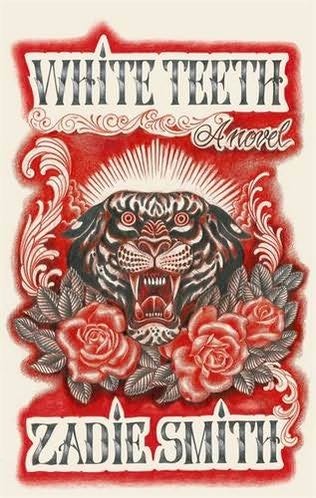 --The blurb--
--The blurb--"One of the most talked about fictional débuts of recent years, WHITE TEETH is a funny, generous, big-hearted novel, adored by critics and readers alike. Dealing - among many other things - with friendship, love, war, three cultures and three families over three generations, one brown mouse, and the tricky way the past has of coming back and biting you on the ankle, it is a life-affirming, riotous must-read of a book."
--The review--
When a book is so densely surrounded by hyperbole, it is easy to become quickly cynical (partly, perhaps, a form of self-protection: we don't want to believe the hype in case we are disappointed), particularly when the author's youth is so publicly lauded as part of it. Is the book being praised just because of its prodigious origins? Or is the buzz that has been generated accurate?
Happily, in the case of White Teeth, its various compliments and accolades are entirely deserved. As well as being engaging and colourful, its characters are well-drawn and very human, and the novel is interspersed with appropriate humour while simultaneously remaining true to what seems to be, ostensibly, its original purpose without being didactic: the idea that we cannot escape our heritage and our past. Smith effectively combines the notions that we can take control of our own lives and that we are at the same time tethered to a loosely defined destiny that is owned by our personal history. The old "nature versus nurture" chestnut is thus rehoused in an innovative way, and Smith's talents are successfully manifested.
Many different cultures are united in this novel, without it seeming contrived, and the result is a realistic yet positive boost in the name of multicultural Britain (but again, Smith manages to achieve this without seeming preachy). The slightly unresolved nature of the ending is also appropriate, and we find out later the origins of the novel's title and the way in which this successfully encapsulates the gaps and similarities between modern Britain's various cultures, as well as (perhaps) the aspirations of those who come to Britain seeking something better.
If there is any criticism to be found here, it's that the jumping back and forth between different time periods can be a little overwhelming, even though this ultimately serves a useful purpose. The novel is an ambitious project and rereadings are therefore merited in order to get a fuller sense of it. However, the accomplishment held between these pages is not invisible even on first reading, and even though I never was keen on the idea of Smith's parody of EM Forster as her second novel, I would perhaps be keener to read more of her work now; the girl done good.
Other works by Zadie Smith
The Autograph Man (2002)
On Beauty (2005)





No comments:
Post a Comment